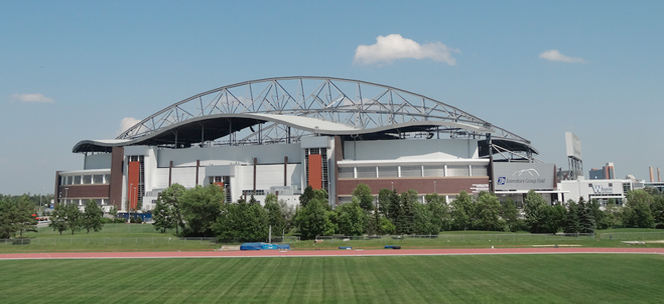Governments need to stop gambling on football

Betting on football is tempting, but it’s important to know when to say no.
In this case, it’s the big gamble taxpayers took on the Blue Bomber’s new football stadium. The price tag for the stadium was initially $115 million, according to a press release issued by the provincial government, city hall, University of Manitoba and the Blue Bombers on Mar. 31, 2010. The cost of the stadium to date is $235 million. (Photo Investors Group Field Wikipedia/Krazyte/Creative Commons)
Losing more than $100 million on a bet is bad, but it gets worse.
This year, the Bombers, province and city are projected to pay down the building loans by $3.9 million. The problem is that the stadium loan has grown by $8 million due to interest costs.
But that’s not all.
Concrete at the new stadium had to be re-poured at a cost of $35 million. It’s yet to be determined who is at fault and who will ultimately pay. But every contractor and developer will admit that there’s a gamble in every construction project. Concrete can crack because of everything from shoddy workmanship to bad luck with weather. Regardless of the reasons, the risks of further costs are real.
There are more gambles on the revenue side.
The city and province planned to use taxes collected on the old stadium site to pay off their shares of the new stadium debts. (This was a questionable plan from the start: if taxes from the old stadium site are paying for the new stadium, who is paying for the streets and sewer lines at the old stadium site?) A new Target store was to be the anchor tenant for the planned development at the old stadium site, but it closed and the expected cash flow has been a trickle. So far taxpayers are losing on this deal’s real estate gamble.
The biggest bet is on the Blue Bombers. It’s sports gambling with sums that would make the highest of high rollers sweat. And the odds are not good.
The Bombers had a rough time on the field, but the cash registers did better. The Grey Cup made money. As did New Direction and AC/DC concerts. The Bombers have been profitable the last two years, but even if every dollar were taken from club’s bottom line, it still wouldn’t be enough to get the stadium debt going down.
Some will try to counter this sober reflection with optimistic talk of spin-off wins. Yes, they say, there are costs and risks, but think of all of the money generated in hotels and restaurants because of the new stadium. This is nonsense. Sure, money spent on a stadium generates spin-offs, but so does money spent on hospitals or highways, or even better, money spent by ordinary people when they get a little tax relief.
This is all depressing, but what should we do now? Mistakes should be identified and decision makers at the city and legislature should be held responsible. Lessons need to be learned and remembered the next time a risky mega-project is proposed.
But there’s a more immediate action to take: say no to the next football bet.
Both the provincial government and city hall have to make it crystal clear that the next time the stadium project needs a cash infusion it won’t come from taxpayers. Ask for money from fans or sponsors, investors or the league, but don’t ask for more money from taxpayers. There’s a simple reality: neither the city nor the province has any extra money to gamble on football.